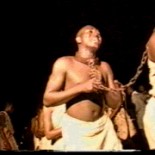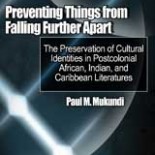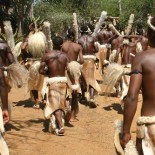The Path of the Slave: Africa, North America, South America & The Caribbean
| The Path of the Slave Africa, North America, South America & The Caribbean |
SORAC’s Africa & the Diaspora in the 21st Century Series
“Ex Africa semper aliquid novi”
Presented and organized by
SORAC (Society of Research on African Cultures)
&
The Institute for the Humanities
Brantl Lecture Hall, Dickson Hall, Montclair State University
Thursday, February 26th, 1998, 8:30am-2:00pm
History of the Conference
SORAC takes on the theme of “Route des esclaves” (The Path of the Slave) which is part of a program of awareness initiated by UNESCO and which has resulted in a series of international conferences on the history of slavery all over the world, notably in the West-Indies, Haiti, parts of Africa and Cuba. MSU’s conference is the first in North America to carry this theme. This conference is sponsored by SORAC (Society of Research in African Cultures) and the Institute for the Humanities, Montclair State University.
The Conference Program
This conference will explore and review the history of slavery as it began in Africa and disseminated the sons and daughters of the “dark continent” to all corners of the planet, giving birth to a rich, diversified, yet sometimes controversial diaspora. At the same time, this re-exploration will stand as an assessment of the current status and/or state of affairs (in terms of progresses and challenges) in the universe of black people around the world. Our speakers will describe the different historical, cultural, and spiritual “paths” taken by African slaves and peoples of African descent to and in their new lands of adoption. It will also examine the impact of the phenomenon of enslavement within the continent of Africa itself.
Continental Africa
Our speaker for continental Africa will review the historical process and facts of slavery as they have manifested themselves within the African continent from the Arabo-Muslim trade incursions of the seventeenth-century to the more systematic development of the slave trade by the European “conquistadores” in colonial times.
Professor Teshale TIBEBU: “The African Path of the Slave”
Dr. Teshale Tibebu teaches African history in the History Department at Temple University. His teaching and research interests include Modern Africa, Social History of Ethiopia, Comparative History (of Nationalism, Feudalism, Slavery), among others. His publications include a book entitled The Making of Modern Ethiopia, 1896-1974 (1995) in which he studies the social history of Ethiopia using the Amharic language as a conceptual framework of analysis. Professor Tibebu is also currently working on a book manuscript dealing with the history of modern African political thought entitled From Blyden to Mazrui: Towards a History of Modern African Political Thought, 1847-1994
The Diaspora
Our speakers will consider the ways in which slavery as a social and historical process has shaped the various experiences of the peoples of African descent since their forcible abduction from the continent of their ancestors has diffused them throughout the world, notably in North America, South America, and the Caribbean. Our speakers will also examine the fructifying influence of these slaves upon the cultures with which they found themselves obliged to integrate.
Professor Herbert S. KLEIN: “The South American Path of the Slave”.
Dr. Herbert Klein teaches in the Department of History at Columbia University and specializes in Latin American history. Professor Klein has published extensively on Latin American and Caribbean issues, including the topic of slavery. His work in this area includes such titles as Slavery in the Americas, A Comparative History of Cuba and Virginia (1967), The Middle Passage: Comparative Studies in the Atlantic Slave Trade (1978), and African Slavery in Latin America and the Caribbean (1986). He is presently working on another book on the Atlantic slave trade.
Professor Luis MARTINEZ-FERNANDEZ: “The Caribbean Path of the Slave”
Dr. Luis MARTINEZ-FERNANDEZ teaches at Rutgers University where he holds a joint appointment in both the Department of Puerto Rican and Hispanic Caribbean Studies (his primary department), and the Department of History. His academic work and interests cover such topics as the history of Latin America, Cuba, Puerto Rico, and the Dominican Republic during the nineteenth century. Dr. Martinez-Fernandez has published extensively on issues pertaining to the Carribean and Latin American worlds. He has a book coming out in February 1998 entitled Fighting Slavery in the Caribbean.
Professor Gregory L. MIXON: “The North American Path of the Slave”.
Dr. Gregory Mixon is an Associate Professor in the Department of History at Rutgers University (New-Brunswick Campus) where he teaches African-American history. He specializes in various areas, including Southern American History, African-American History and Urban History. Dr. Mixon has published extensively on issues relating to Black America and has contributed articles to books such as Repression and Retaliation: Resistance Movements by African-Americans (Edited by Felton Best, 1995) and The Encyclopedia of African-American Civil Rights From Emancipation to the Present (Edited by Charles Lowery and John F. Marszalek, 1992).




